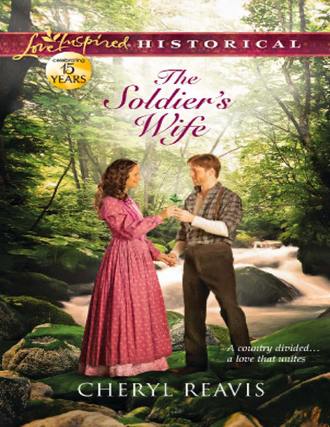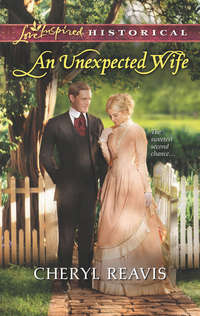
Полная версия
The Soldier's Wife
* * *
“Sayer! Sayer!” the girls suddenly called to her, and she began walking in their direction.
“Will you read to us after supper?” Beatrice wanted to know, twirling again around and around the pan of corn. Sayer suddenly imagined her all grown-up and dressed in a white gown with gardenias in her hair, dancing the evening away at the Harvest Moon Ball in Salisbury, the event Sayer had heard so much about when she still lived in her uncle’s house, the one she had known even then that she’d never be allowed to attend.
Poor Cinderella, Sayer thought a little sadly, thinking of them both. No white dresses and gardenias for us.
“What shall I read to you?” she abruptly asked, putting her fanciful notions about the social events in Salisbury aside. She smiled, because she already knew their answer. She had diligently tried to make sure that neither of them forgot their brother, despite the lost daguerreotype and the years that had passed, especially Amity, who had been only four when he left.
“Read us a letter from Thomas Henry!” they both cried.
Chapter Two
“What’s wrong?” Jack asked. There were too many of his comrades still awake. All of them should have been lying exhausted on the ground save the two on watch, but it looked as if the entire group was alert and waiting—for him, apparently.
“Nothing,” Little Ike said after a silence that went on too long.
Jack sat down on the ground close to his blanket and haversack. He was emotionally and physically spent. He’d managed to get the dead Rebel wrapped in his blanket and more or less buried. Jack impulsively kept the man’s letters and personal belongings and stuck them inside his jacket. He took them out now and began looking at them. Not a single man asked him what he had or what he was planning to do with whatever it was.
He glanced in Little Ike’s direction. “You get your letter read?”
“Oh! Well—” Ike said. “I— It was—” He stopped. He took his battered cap off and twirled it in his hands. Then, as if suddenly wondering how it had gotten there, popped it back on his head again.
“You know,” Jack said after a long moment, “I didn’t think the question was all that hard.”
“We got the canteens filled,” Ike said, clearly hoping to move Jack along to some other topic of interest.
“Did you get the letter read?” Jack asked again. He looked at the soldiers closest to him—Boone. Donoho. Weatherly. James. All of them looked elsewhere.
“Are we the Orphans’ Guild or not?” he asked. It was the name that had been given to them the first day the company mustered, one they’d taken for their own with a fierce kind of pride. They looked out for each other and they didn’t keep secrets, especially not from him.
“Tell him, Ike,” Boone said finally.
But Little Ike was fiddling with his hat again.
“Tell him!”
“It was in the letter,” Ike said in a rush. Most of the words went down his jacket front.
Jack waited, but that seemed to be the only information Ike was willing to impart. He didn’t suggest that he continue, however. Jack had learned early on, from his days in the orphanage, that the quickest way to a revelation was not to demand it. He went back to looking through the dead Reb’s personal effects: a Bible, a clay pipe bowl, an empty leather tobacco pouch, a daguerreotype he couldn’t see in the erratic moonlight, a packet of letters tied up with a ribbon, the color of which he also couldn’t determine. He could feel the watchful attention of every man around him, but he didn’t look up. He pulled one of the letters free and tried to decipher the address. He could only make out part of the handwriting: Co. G Highland Guards. He had heard of the Highland Guards, but that was after what was left of the Orphans’ Guild had been shifted from the Army of the Ohio into an equally decimated company in the Army of the Potomac. Jack had been half convinced that the Guild soldiers had been the ante in some kind of high-stakes poker game. A general from the Army of the Ohio folded, and off the orphans went. Even so, he and the rest of them still thought of themselves as soldiers of the Kentucky regiment they’d volunteered for, regardless of what the generals said.
He turned the letter over in his hands, but he made no attempt to read it. The Highland Guards had been at Sharpsburg and at Malvern Hill, just as he and the newly reassigned Orphans’ Guild survivors had.
Sharpsburg.
Malvern Hill.
One thing he had learned in this war. Nothing qualified for cannon fodder more than a company with a true majority of bona fide orphans.
“Jack?”
He looked up.
“She went and got married, Jack,” Ike said.
“Are you going to tell me who ‘she’ is or do I have to guess?”
“Miss Elrissa Barden,” Ike said, his voice full of misery. “My cousin...she says he’s rich,” he added helpfully.
Jack reached for his haversack, rearranging the contents so that he could add the dead Rebel’s belongings. He might find a way to mail the letters, and then again, he might not. “His name?” he asked.
“It’s...Vance.”
Jack looked at him. “Farrell Vance?” he said, surprised by his response to the information. He should have been intensely disturbed, at the very least, but he wasn’t. After a short moment, it seemed...only logical. Farrell Vance had money—a lot of money—more money than good old Jeremiah “Jack” Murphy would ever have, even if a marriage to a wealthy store owner’s daughter had happened. Vance was a store owner, as well—among other things—but his real money came from the war, from army contracts. There was plenty of profit to be made there, especially if a supplier was willing to cut corners. He had no doubt that Farrell Vance fell into that camp.
“That’s him,” Ike said. “My cousin, she wrote it was a really big wedding. Nobody ever seen anything like it in Lexington before, I can tell you that. Her wedding dress come all the way from Paris somehow or other. Must have been hard, what with the war and everything. It had all these...rosettes or some such thing. What do you reckon a rosette is— Ow!” he said, his report interrupted by his nearest comrade’s elbow. “What did you do that for, Boone!”
“I did it hoping you might start using that head of yours for something besides parking your hat!”
“Well, you said to tell him!”
The argument, peppered with insults, continued, but Jack was no longer listening. Elrissa Suzanne Barden...Vance.
Jack had never formally asked her father for her hand. She had wanted him to wait until he came home again, and he had agreed, thinking that Mr. Barden would be more apt to remember how important Jack had been to his business if he was standing right in front of him. He hadn’t really considered that Mr. Barden would say no. The man had set the precedent that his beloved Elrissa could have whatever she wanted a long time before Jack Murphy came along.
But clearly Elrissa had changed her mind. It occurred to Jack that no one in her circle likely knew anything about his marriage proposal much less that she’d accepted him. And when this greater matrimonial opportunity arose, she must have realized she could marry Farrell Vance without consequence. With any luck at all, Jack Murphy would end up like all too many of his fellow orphans and wouldn’t be coming back from the war at all. Or if he did survive, he wouldn’t likely go around telling people he’d been taken for a fool. It occurred to him, too, that it must require many months to put together a wedding that included a dress from Paris with “rosettes,” and Elrissa must have continued writing to him until she was absolutely sure the better marriage was a certainty.
“That’s that, then,” he said, realizing too late that he’d said it out loud.
“That’s right, Jack,” Ike said. “Ain’t no use worrying about it.”
“Whose turn is it to take watch?” Jack asked, ignoring Ike’s comment.
“Fred’s,” somebody volunteered. “And Jacob’s...” The sentence faded away into a different kind of silence.
“Mine, then,” Ike said after a moment. “And Boone’s.”
“Well, don’t the two of you be squabbling like a couple of old women,” Jack said despite the fact that two more of the Orphans’ Guild were dead and gone. He was glad it was Ike’s turn. Ike couldn’t tell when he was putting a foot wrong and stumbling all over something socially, but he had finely honed senses when it came to anticipating danger, probably because of the years he’d spent hiding from his violent drunkard of a father.
“No, Jack,” Ike said earnestly. “We won’t. I ain’t letting them Rebs sneak up on us.”
“That’s good to know, our situation being what it is,” Jack said. “What’s that?” he asked because of a sound in the distance he couldn’t identify.
“Sounds like singing,” Boone said.
And so it was, but Jack couldn’t make out the song. It was something wistful; he could tell that much. A farewell for a fallen comrade, he decided, as more voices joined in, perhaps for the man whose letters he still held. He felt a burning in his eyes suddenly, an ache in his throat. He stuffed the letters into his haversack. His hands were beginning to tremble again. This time he wrapped himself in his blanket to hide them and turned his back to the others. He lay down on the ground and closed his eyes, but he had little hope of sleep. His body ached with fatigue, but his thoughts swirled around and around in his head so fast he couldn’t dwell on any of them. He tried to find some sound to concentrate on—the whip-poor-will, the singing, anything—so that he could shut out everything else, but it didn’t help. The more he struggled, the more his mind raced. Eventually, though, as it had more than once, the sound he so needed turned out to be one inside his own head. After a moment, it rose out of the chaos: Father Bartholomew reading aloud to them on the cool upstairs porch on Saturday afternoons after their chores and their Saturday baths were finally done. The Rime of the Ancient Mariner. It had been a favorite of the younger boys and, he thought, of Father Bartholomew. The ancient mariner. The man who could not pray.
Jack concentrated on the poem, word by word, line by line, not caring if they were out of sequence or not. After a time he began to whisper random phrases to himself. “‘The praise be given...the gentle sleep from heaven...slid into my soul….’”
But there was no chance of that happening this night.
“Jack,” Boone said, shaking him hard.
“What!” he snapped because he hadn’t been asleep.
“They’re not singing now, Jack. Maybe you better come listen.”
He sat up and struggled to his feet, wishing for the second time tonight that he associated with men who could speak in specifics. He looked toward the battlefield, keeping his fists clenched because the second episode of shaking hadn’t yet subsided. The soldiers he couldn’t see had stopped singing, just as Boone said, but what they were doing instead, Jack couldn’t tell.
“You see anything, Ike?” Jack called.
“Nothing!” Ike called from some distance away. “Whatever it is, it’s coming this way.”
“Us or them?”
“Don’t know!”
“At the ready!” Jack shouted, and they all scrambled to grab up their gear. Then they waited, muskets resting on whatever prop they could find, all of them straining to see in the darkness. Every now and then Jack could hear the whip-poor-will in the tall pine at the edge of the field.
“Jack!” Ike suddenly cried. “Did you hear that! Lee surrendered!”
“Stay down!” Jack said sharply, before the rest of his charges forgot where they were in the excitement of Ike’s announcement. He’d been at this too long to trust a voice shouting in the night. And if it was true, he had enough sense to know that the war would be over for the Rebs, not for them.
The shouting grew louder as the news came down the line. He could hear the men clearly now, again and again. “Lee surrendered!”
So.
Just like that. This morning they were at war and now they weren’t. How could it be over? he thought. And they had won. After all this time and all this killing and dying, they had won. But what exactly was the prize, he wondered, and at what cost?
Unable to contain their joy any longer, the men around him sent up a rousing cheer. He tried to feel their elation, but he was too worn down by the events of the day to feel anything.
“Where are the tin cups?” he asked abruptly, not really addressing anyone in particular.
“What tin cups, Jack?”
“Fred’s! Jacob’s! Where are they!” He needed them. Whenever an orphan fell, he sent their army-issue tin cup to Father Bartholomew. He scratched their names and when and where they died on them. He didn’t know what Father Bartholomew did with them. All he knew was that he, Jack Murphy, needed to send them.
“It’s all right, Jack,” Boone said, grasping him by the arm. “Ike took care of it. He wrapped them up good and tagged them to go to the orphanage. The hospital wagon was picking up the wounded, so he sent them back on it. Somebody will see they get there.”
“The names— Did he—”
“He scratched the names. He did all of it. You don’t have to worry.”
“Good,” Jack said. “That’s good.”
He could feel Boone staring at him. He pulled his arm free and sat down on the ground again. He had to pull himself together.
Elrissa’s marriage, he thought, wiping the sweat from his brow with a shaking hand. Her betrayal had laid him lower than he had been willing to admit.
Lee surrendered.
Lee surrendered...
And that was the thing that bothered him so, he suddenly realized. General Robert E. Lee had surrendered.
Too late for Frederick and Jacob and the rest of Father Bartholomew’s dead orphans. Too late for Thomas Henry Garth and for a young woman called Sayer.
Chapter Three
It took the Orphans’ Guild nearly three months to get back to Lexington, though to Jack it seemed hardly any time at all. He’d long ago lost the need to mark the passage of time when it had so little bearing on what he did. Not meals. Not sleep. Nothing. For four years, he had been dedicated only to going where he was told to go and doing what he was told to do—and staying alive while he did it. He’d learned early on to let the passing of the minutes and hours and days take care of themselves. They had nothing to do with him, at least until he returned to Lexington. It was only then that clocks and calendars became important again, because he needed to decide on what day and at what time he might be able to see the new Mrs.Vance face-to-face, and he had no one he wanted to ask for guidance in the matter. He already had too many unsolicited opinions regarding his situation with Elrissa.
His best guess was early afternoon. Elrissa should be at home then and Farrell Vance should not. And with that simple conclusion, he took pains to shave and to wear a freshly starched and ironed white store-clerk shirt and the best suit a sizable chunk of his army pay could buy. It was a long walk from the orphanage, where he was staying in the visitors’ quarters, to Farrell Vance’s impressive new stone residence. The walk itself was pleasant enough, given his recent history of ambulating from battlefield to battlefield over more of this country than he cared to think about. It eventually took him to a cool, shaded street lined with several newly built houses—or new to him at any rate. It rather surprised him that Vance hadn’t acquired a place near Mary Todd Lincoln’s house, and it was just Jack’s luck that his destination turned out to be the biggest house of them all.
Jack recognized the Vances’ new maid the moment she opened the front door, despite the cap covering most of her wild red hair. The freckles were still visible, however, as was the ever-present wariness in the clear blue eyes. She had learned before she could walk not to trust people, and she wasn’t about to let go of the lesson just for Jack Murphy.
“Hello, Mary,” he said easily. “I’m here to see Mrs. Vance—if she’s at home to visitors.”
“Jack, are you crazy!” Mary stepped out onto the huge porch and pulled the door to behind her, her heavily starched, pink-and-white uniform rustling in the process. Clearly, even the maids in Farrell Vance’s house dressed better than the girls at the orphanage ever would. “You can’t come to the front door like this!”
“I can’t? Why not?”
“You’re the hired help. You work for Mr. Barden.”
“I haven’t worked for Mr. Barden for four years,” Jack reminded her. “Nice house,” he added, looking around the front porch at the potted ferns and assorted flowers.
“Mr. Vance won’t like this,” Mary said.
“I’m not here to see Mr. Vance. I’m here to see Elrissa.”
“Why?”
“I want to thank her for her...kindness while I was away—in person, if you don’t mind. All you have to do is ask her if she’ll see me. You can’t be blamed for what happens after that.”
“You’d be surprised what a body can be blamed for in this house. Besides that, you are such a liar. She’s married now. You’ve got no good reason to see her and plenty reasons not to.”
“That’s a matter of opinion, Mary.”
Mary looked at him for a long moment—while Jack struggled to hold on to his impatience. He’d come a long way to stand on Elrissa’s front porch—or was it a veranda?—and he’d done it against the advice of practically every orphan he knew. Only Little Ike had opined that Elrissa needed to own up to her poor treatment of one Jack Murphy. And, in this rare instance, Jack heartily agreed. Now all he needed was to get past Mary.
“I heard she didn’t even send you a letter to tell you she was marrying somebody else,” Mary said, reminding Jack that while the mail wagon for the Army of the Potomac might not have come as often as he and the rest of the Orphans’ Guild would have liked, it did run in both directions. He didn’t need reminding that what one orphan knew, they all knew.
“And that is none of your business,” he said anyway. “I want to see her. The whole rebel army couldn’t stop me from getting what I want, Mary, so I’m not really worried about you.”
She exhaled sharply. “Jack, if you do something to make me lose this job—”
He smiled his best smile, rusty though it might be, and that was all it took.
“Oh, all right, then,” Mary said. “And stop smiling at me. Kissing the girls and making them cry—that’s all you’re good for.”
His smile broadened. “They don’t always cry, Mary. You know that.”
She shook her head at his blatant teasing. “I’ll...go ask her. You stay right here. Right here. And I mean it.” She reached behind her and opened the door. “I mean it!”
“Yes, Mary,” he said dutifully. “I’ll stay right here.”
“See that you do,” she said, determined to have the last word. She backed into the house and made a point of closing the door as firmly as was possible. He waited, listening to the sparrows chirping from their nests under the eaves, looking around the wide front porch again, wondering idly if Elrissa had decorated the stone pillars with red, white and blue bunting for the anniversary of national independence. He thought she might have, even though he’d never known her to care much about the Fourth of July celebration. Her husband would, of course. It would be bad for his business, given the country’s recent victory, if he didn’t participate as noticeably as possible.
A large yellow cat wandered up from somewhere behind the spirea bushes and made several passes against his legs. He reached down and scratched its ear for a moment and wondered what was taking Mary so long. The cat walked away and there was nothing to do but inspect the porch again. There was a swing and two comfortable-looking chairs a few feet away, and he was tempted to go sit in one of them. He had always wanted a porch like this, a place where he could bide his time and drink lemonade and read the newspaper on a quiet Sunday afternoon. He had never been able to see Elrissa sitting in a rocking chair beside him when he imagined this idyllic setting, however.
The front door opened, and Mary stuck her head out. “Well, come on, then,” she said. “She says she’ll see you. I still say you’re crazy, and I’m beginning to think she is, too.”
“You may be right about that, Mary. Lead the way.”
He followed her into the dark coolness of the wide center hallway. He could immediately feel the strong draft created by the opening and closing of certain windows and transoms. It was a tribute to how well the house was built that, even on a hot summer day like this one, there was a steady breeze blowing on the inside.
The inner breeze carried the scent of lemon and beeswax Mary had likely spent hours applying to every wood surface in the place. He had no doubt that she would have learned the ins and outs of furniture polishing at the orphanage, and to such a degree that she could make her living doing it. He couldn’t smell any food cooking. It was likely that there was a big summer kitchen detached from the main house somewhere out back.
“Don’t you stay long,” Mary whispered before she let him into the room where Elrissa must be. “He’ll be home to check on her in a little while.”
“Check on her? For what?” It occurred to him even as he said it that Elrissa must already be having a child.
“None of your business. Just do as I say.”
He smiled at her again, giving her a wink. She swatted the air in exasperation, then opened the door.
“Mr. Murphy, ma’am,” she said, standing back so he could enter.
Elrissa waited on the far side of the room, and she was even more stunning than he remembered. Her pale blond hair had been twisted into ringlets and intricate rolls and braiding. Her hands were clasped at her waist as if she needed to hide their trembling. He might feel a small pang of sympathy if that was so, though trembling hands wouldn’t be in keeping with Elrissa’s headstrong personality at all. She was much more likely to cause the affliction rather than suffer it.
“Mrs. Vance,” he said with a quiet calmness he must have learned on the battlefield. His voice didn’t reflect his inner turmoil in the least, and he was glad of that.
She stood looking back at him, leaving him nowhere to go and nothing to say. He knew very little about women’s clothes, but even he could see that when it came to afternoon dresses and maids’ uniforms, Mary’s was not the only wardrobe that had been significantly enhanced.
“It’s good to see you, Jack. It’s taken you a long time to get home,” Elrissa said, smiling.
“Not that long. We were lucky. Some companies aren’t being discharged at all. The ones that came to the party late or didn’t see much fighting. It’s only fair, in my opinion.”
“Oh. Well. It seems a long time to me. I’ve been wondering if you’d even come back to Lexington at all. No one seemed to know.”
“You asked about my return?”
“Well, about the regiments,” she said. “We’re all very proud of the Kentuckians. Papa and Farrell and I traveled down to Washington in May for the Grand Review. It was...thrilling. Two days for the army to pass. I looked for you in the parades, but I didn’t see you. Were you there?”
“Yes. All the orphans were there—what’s left of us.”
She was looking at him so intently, as if she expected him to make some comment about her having witnessed the Grand Review. He had no idea what she expected him to say—that he’d looked for her among the throng of spectators? He hadn’t. The truth was that it never occurred to him that she might be there.
“Why are you here, Jack?” she asked abruptly.
He looked at her in surprise. “Why? Well, I thought we’d start with an explanation—yours. I think I deserve that much—and then we could conclude with an apology—also yours.”
“Apology? My goodness.” Clearly such a thing had never occurred to her.
“You said you’d marry me, Elrissa.”
“Yes, well, that was never really...official, now, was it?”
“It was official to me. Why did you do that? Say you’d marry me if you had no intention of doing so?”
She waved one hand in the air. “I was very young, Jack. To tell you the truth, I just didn’t think. You were leaving. The train was coming—I had no time to think. Later I realized my father would never have agreed. You’re not...”







